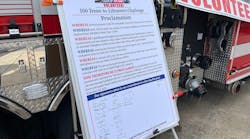Sept. 10--It's been 12 years.
What have survivors found helpful in recovering from the terrorist attacks that took their sons and daughters, moms and dads, husbands and wives, moms and dads, friends and colleagues, sisters and brothers at the World Trade Center?
Therapy, art, charity work, prayer and memorializing departed loved ones are among the coping mechanisms people adapted since the tragedy that took 2,753 lives.
Sharon Watts, 60, an artist who now lives in Beacon, NY, researched and wrote a book about her friend and former fiancee, FDNY Capt. Patrick J. Brown, one of 343 fire fighters who died at the World Trade Towers, and published "Miss You, Pat," in 2007.
Seeing the life of the Vietnam vet who became a yoga practitioner and devotee of Buddhist principles while rising to captain in the FDNY through the lenses of all who knew him "helped me rise above the sadness," and eased her isolation, she explained. Watt was intent on paying tribute to Brown but also "wanted to do something to connect all the people who were missing him." The book became "a sharing thing," that proved both cathartic and therapeutic. She wrote another, "Back to My Senses," about her own healing voyage.
"There is no right way to grieve," said Mike Friedman, a clinical psychologist for Manhattan Cognitive Behavioral Associates. Constructive, hopeful acts that have personal meaning or help others can prove healing after losing a loved one, Friedman said. Many survivors said they kept intentionally busy for a time before they could indulge memories of their loved ones without becoming swamped by sorrow. "You just keep going," was a common refrain. "Focusing on the things you love and the things you can control is not denial. It's good coping," said Friedman.
The need to care for (often, traumatized) children forced many 9/11 parents to rally.
"I coped by putting my total 24-hour day into my two kids: By making sure they had a good life. I've done that for 12 years, every day," said James Alario, 55, an investor from Lighthouse Hill, SI, whose wife, Margaret Jezycki Alario, a manager at Zurich American Insurance Company, died at age 42. "She would have wanted me to do that but I'm like that anyway," said Alario.
Jesuit counseling helped Alario compartmentalize his grief by teaching him, "you have to keep living. That was the whole thing. You can't feel guilty," Alario chorused.
Marta Morocho, a mother of six in Sunset Park, and an immigrant from Equador said she devoted herself to learning all the tasks her husband, Leonel Morocho, a sous chef at Windows on the World who died at age 36 (with his sister, Blanca, another of the restaurant's employees), performed to keep the family going.
"I needed to learn everything," she recalled.
She learned how to drive, how to obtain green cards (she became a citizen three years ago), how to handle tricky home repairs and difficult tenants. Then she learned "to enjoy the life" because it can disappear at any time.
Monica Morocho, 26, Leonel Morocho's daughter, decided to pay homage to her relentlessly hard-working father, by perservering, as he had, despite adversities. "I hope to make him proud," she explained. "You have to be strong and keep on going."
"I had two little kids at the time and I couldn't roll up in a ball," recalled Suzanne Tinley, 56, a sales manager, who was living in Tribeca on 9/11 and watched Tower One pancake knowing that her brother, Michael Tinley, 56, a vice-president of Marsh & McLennan from Dallas, was inside.
Tinley underwent Eye Movement Desensitization and Reprocessing psychotherapy, a treatment developed specifically to help trauma victims.
"It was helpful," she recalled. "It gave me the chance to forgive myself: You always wish you could have done more," to save your loved one, said Tinley, who now lives in Chappaqua.
David Brace, 75, of Stapleton, S.I., continued in his clerical job for 15 months after his wife, Sandra Conaty Brace, 60, an administrative assistant at Risk Insurance Solutions, was killed.
"What sustained me was carpooling with my foreman. I had someone to talk to in the darkness," recalled Brace, who is now retired from his clerical job at a gas company.
A manager who helped him sort out the painful task of what to do with his wife's remains was also a comfort. Eight cats, a model train set and a new bicycle keep him busy. But what most salved Brace's grief was volunteering for Meals on Wheels and visiting elderly people who had not had his good fortune in aging with vigor.
"It gets me the hell out of the damn house and out on the street. Everything else about my life is worthless except that," said Brace. Seeing how others meet the challenges of cancer, macular degeneration and frailty gets his mind off his own loss.
This year Brace won't go to the Memorial to hear the reading of his wife's name because his Meals on Wheels clients are looking forward to his Wednesday visit. "I want to move on and not stay immersed," Brace explained. "It's been 12 years. It's time to let it go a little bit."
Copyright 2013 - amNewYork, New York





